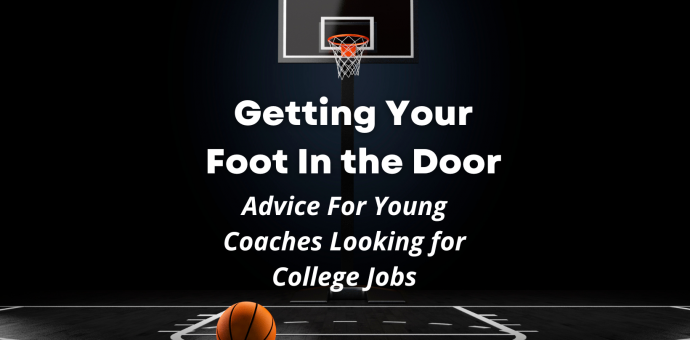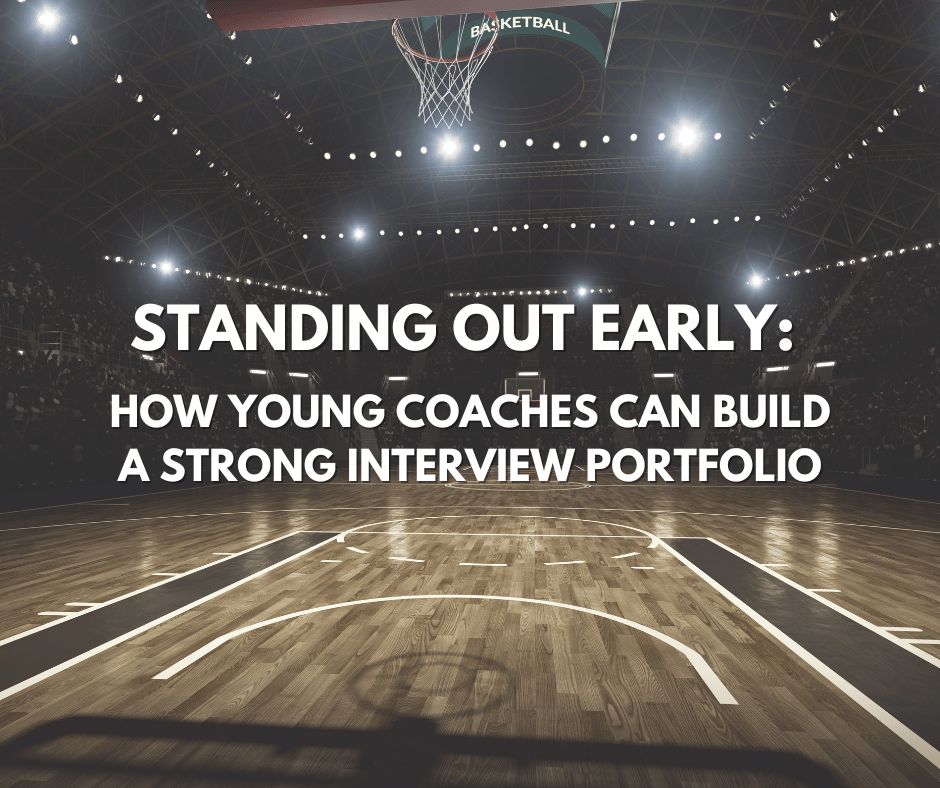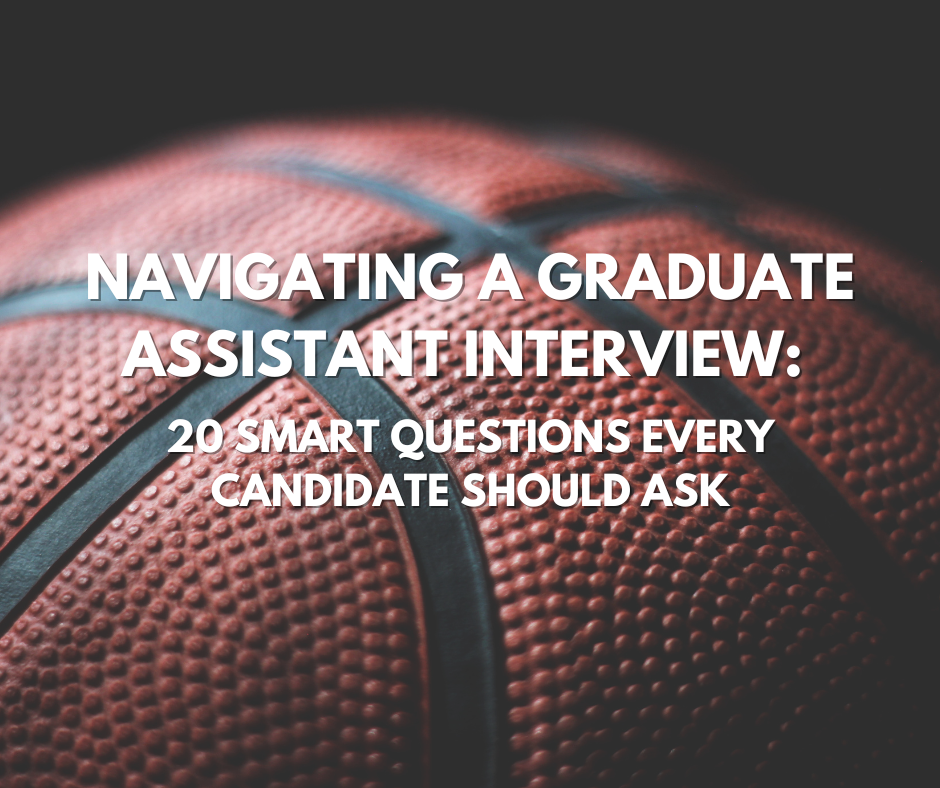Written By: Bill Vasko, College Coach & Founder of The Coaching Portfolio Guide
The competition for GA and entry level college coaching positions, even at the lower divisions, is insane. This is especially true in football and basketball. There are so many coaches and aspiring coaches, young and old, who are looking to get their foot into the college coaching door. Things have gotten so crazy at the Power 5 level that we see top assistants or even head coaches who get fired and become GA’s at other programs (obviously this is the case if they already did not have a master’s degree).
Unless you played or have really good connections, it can be near impossible to land a GA position. Most GA positions are filled with someone the coach knows or by someone who was referred to them. Rarely does an unknown person come in and get the job unless they’ve got an outstanding playing or coaching resume.
Many young aspiring coaches think they are going to land a GA job and work another job on or off campus to make ends meet financially. It just doesn’t work that way. When you are a GA, you are typically expected to be there full time. That means minimum 10 hours a day 7 days a week during the season, and 40+ hours in the off-season. That’s why most GA’s can only afford to do it when they are young and single.
If you’re out of college and looking for a way to get into college coaching, your best bet to get experience without totally sacrificing everything financially is to seek out volunteer or part-time positions at smaller colleges near you. Make in-person visits to talk to the coach and see if there is anything you can do to help. That way, you can get a position that will give you more flexibility to work a second job. If you really want to work your way into the profession, then expect to spend every spare hour you have at the athletic office. That’s the only way to learn and also gain a good recommendation from the head coach.
I have a lot of volunteer and part-time experience in my early years on my resume. But most of those jobs, I spent full-time hours at the office because I knew I had to make an impression if I wanted to move on to a better position. Since I spent so much time working and had so much responsibility, I did not have to list those jobs on my resume as “volunteer” or “part-time.” I worked full-time hours for part-time pay or for free. If you just show up for practice and pre-practice meetings, don’t expect the head coach to give you a glowing recommendation when you start applying for full-time positions.
Here are some tips on getting a GA or entry level college position…..
1. Are you credible? Do you have your degree, certifications, and practical experience that qualify you for the position you are seeking? Most of the time, people think just because you have these things you are qualified. The reality is that it just keeps you in the conversation.
2. What do you bring to the table? Can you sell yourself to the Head Coach you want to work for. In the world of coaching, it is important that the coaches and athletes believe in you. It’s hard to believe in a coach that has never played that sport, or coached it somewhere prior. I am not saying you don’t understand the sport. I am simply stating that understanding the sport complexities are a positive. That is why a well-rounded background is important. It is also why former athletes have an advantage.
3. Who else says you are good? There are plenty of good coaches out there for only a few jobs. You have to get your foot in the door and that comes through networking. Rarely does a head coach hire someone they do not know, or at least have a common connection with. You need to get out and meet as many coaches as you can, and leave a lasting impression. Work camps, attend recruiting events, attend the national convention as well as any smaller state or local clinics and conferences.
4. It is important to understand that there are hundreds of coaches that want the same job you are applying for. You must have quality application materials: a well-worded cover letter; a resume that accentuates what you bring to the table, experience with that sport, and references to validate your skills; a portfolio that outlines your philosophies and beliefs.
How Do You Build a Coaching Portfolio with Limited or No Coaching Experience?
I received an email from a new portfolio guide member who was a college athlete that had just recently received his undergraduate degree. He asked how he should build a coaching portfolio when he lacked coaching experience. In my opinion, it is important for young, aspiring coaches to start to put their thoughts and ideas down on paper to develop their thought process regarding the profession. This will not only demonstrate their commitment to the profession to potential employers, it will also allow them to critically think about what their values and philosophies are as a coach.
Here are the sections I would focus on in a portfolio for someone who recently graduated from college with minimal coaching experience:
Career highlights – I would put your playing career highlights – honors, awards, individual and program achievements. I would also talk about off the field activities you were involved in, especially any mentoring or community service activities. As a young assistant, you are going to be asked to head up a lot of the off the field activities, so if you were an active participant as a player, you want to demonstrate that you can also lead those things as a coach.
Coaching Philosophy – If you haven’t created one yet, now is the time to do so. I made mine while in college and I still use it today. There is a section in the coaching portfolio guide on how to get started.
Core values – this is another section you can start to develop even without much coaching experience.
Letters of recommendation – I do not include these now, but I did when I was just starting out in the profession. Get them from your head coach, position coach, strength coach, etc. Ask them to make the letters out to “Whom It May Concern” so that you can use them in your portfolio.
Recruiting – You won’t necessarily have a “recruiting plan” but I think you should put some thought into how you could be successful at recruiting potential student-athletes. That will be a big part of your position. Young staffers spend hours on the phone calling/texting recruits. Think about ways you can connect with young prospects that will make you stand out. Young coaches are so important in connecting with today’s recruits. Recently the NCAA came out with new recruiting rules permitting coaches to play video game with recruits virtually. I’m like, why the heck would I want to play video games with a recruit??? But today’s recruits love that type of interaction with young assistant coaches who are recruiting them.
Building Culture within a program – Again, even though you may not have much coaching experience, you can still start to map out your thoughts on what it takes to build a strong culture within a program. A program is only as strong as the assistant coaches. The head coach has so many administrative duties to deal with that they rely heavily on their assistants to set the standard for the day to day culture.
Academics – If you were a strong academic student, maybe discuss what things helped you be successful. Young coaches are often in charge of study tables and serve as liaisons for academic advisors. This would be a great way to show the value you could bring to a program.
Social Media / Photoshop – if you are not proficient in these areas, you need to be. GA’s and young coaches are often responsible for running social media accounts and creating graphics, especially at smaller schools. If you are really good at these things, show samples of your work.
Strength & Conditioning – many small schools still have to utilize their coaches to run the S&C program. If this is an area you are strong in, discuss some of your philosophies here. This was an area that I gained a ton of experience in as a young coach.
Tactical Philosophies – at some point, you will most likely be asked to get up on the white board and show what you know. Put together some thoughts on key elements of positional play for those positions you know well.
I don’t believe you have to have all of these things in your portfolio as you start out, but I think these areas would give you a great start in developing your personal philosophies and beliefs. The job market for GA coaches is extremely competitive, especially in football and basketball. Anytime you apply or even if you are reaching out to head coaches to inquire about any openings, be sure to correspond with a brief but professional introductory email. Add your resume and portfolio as attachments. I get many unsolicited emails from players who are about to graduate and are seeking GA opportunities. The ones who stand out are the ones who are professional and provide info on what they could bring to my program. It’s easy to filter out those who are strictly looking for a GA position because they want to get their master’s degree or those who have put no thought into what it may be like to actually coach.
Need Additional Help?
If you need help with your coaching resume or portfolio, check out The Coaching Portfolio Guide. The Coaching Portfolio Guide is an instructional, membership-based website that helps you develop a personalized portfolio for any sport. We also have tips and templates for resumes and cover letters. Receive a FREE copy of The Complete Guide to the Coaching Interview, which includes over 250 sample interview questions specific to coaching jobs + the best answers to common interview questions, when you sign up for The Coaching Portfolio Guide at www.coachingportfolio.com.






